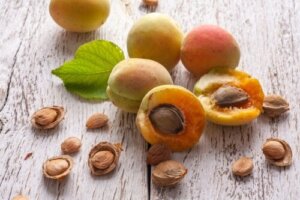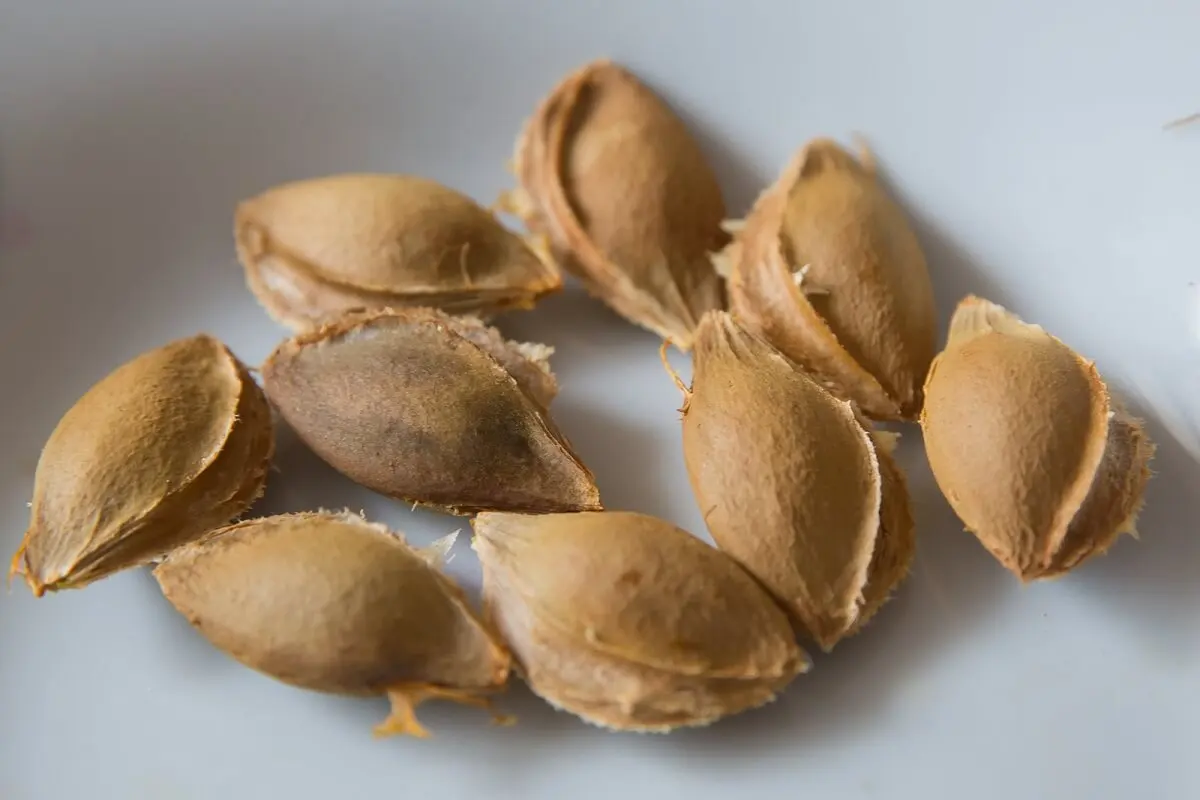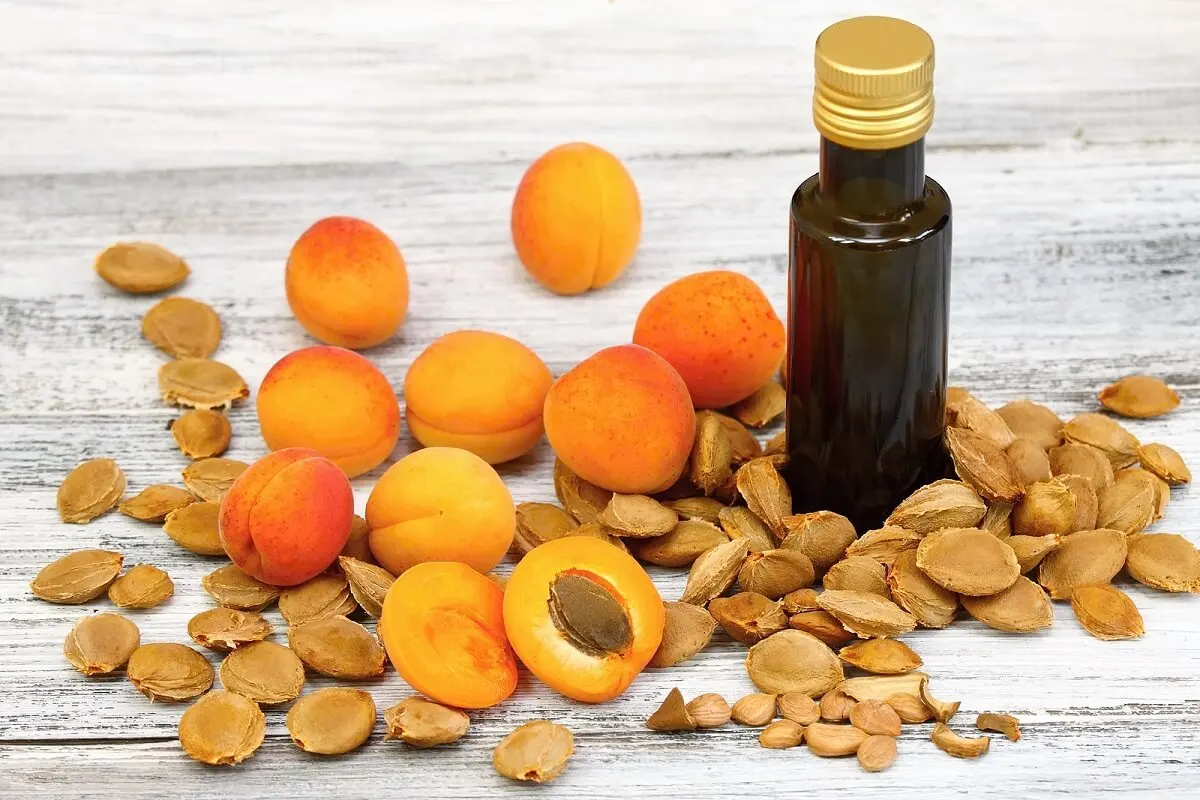What Do We Know About Apricot Seeds?


Written and verified by the nutritionist Anna Vilarrasa
Generally, when eating a piece of fruit, most people end up discarding the pit or seed. However, is it possible that nutrients with anti-cancer properties are concentrated inside the stone? This seems to be the case with apricot seeds.
In recent years, several researchers have spoken about the effects of apricot seeds or pits. Even so, regulatory bodies warn about the risks of consuming them in excessive amounts, as they can cause cyanide poisoning. Are you interested in knowing more about them?
Apricot seeds
The nutritional composition and properties of apricot seeds are different from those provided by fresh fruit. In particular, they stand out for their fat content, which corresponds to half of their total weight. To be more precise, they contain omega 3 and 6, 25% protein, and 8% carbohydrates.
Because of this, there has been talk of their possible benefits in stabilizing blood cholesterol and improving inflammatory diseases such as ulcerative colitis. Their ability to protect and moisturize the skin has also been highlighted. In addition, in recent years, they have been investigated for their anticarcinogenic potential.
The first references date back to 1920, when Dr. Ernst T. Krebs already used it in the form of oil to treat people affected by this disease. However, in those tests, it proved to be too toxic. Consequently, their safety is still in questin.

We think you may be interested in reading this, too: The Longan or Dragon’s Eye: How Nutritious Is this Exotic Fruit?
Why are apricot seeds considered anticarcinogenic?
Apricot seeds have been found to contain components that appear to have anticarcinogenic activity. In addition to the presence of different types of fat, protein, and carbohydrates, this ingredient contains vitamin B17.
In this regard, Dr. Krebs related a deficit of this vitamin to the appearance of cancer. Thus, he argued that providing it in supplement form could help to stop the growth of cancer cells.
This nutrient is also known as “amygdalin” or “laetrile” (a proprietary brand name for a derivative). It’s said, therefore, that when apricot seeds are chewed, this chemical element is degraded, and hydrogen cyanide appears. In this way, antineoplastic activity occurs, which seems to be an adjuvant in stopping the growth of tumors.
But what do the current studies say? Is it really effective? Well, at present, apricot seeds are in no way considered a first-choice treatment. Although they are used on some occasions, the National Cancer Institute of the United States does not consider them adequate.
This is because studies have only been done on animals and have not given positive results in humans. On the contrary, there are many doubts about the possible risks involved. Their use is even banned by the U.S. Government.
Like this article? You may also like to read: Acidic and Semi-acidic Fruits: What Are They and What Are Their Effects?
The problem of cyanide poisoning
The main health risk of apricot seeds is the possibility of suffering from cyanide poisoning. According to the European Union Food Safety Agency (EFSA), the pits of the fruit contain amygdalin. This substance releases cyanide and is absorbed by the body.
The main target of this chemical is the central nervous system, along with the kidney and thyroid. In high doses, it can cause a number of intoxication symptoms, such as the following:
- Nausea
- Fever
- Headaches
- Thirst
- Lethargy
- Nervousness
- Joint pain
- Muscle pain
- Hypotension
- Death (in some extreme cases)
The studies EFSA works with indicate that a variable amount, between 0.5 and 3.5 milligrams of cyanide per kilogram of body weight, can be fatal. The amount considered safe and acceptable intake is set at 20 micrograms per kilogram of body weight, which is equivalent to one large or three small seeds.
Studies on apricot seeds
Several scientific and clinical analyses have been performed on the effect of amygdalin. Most of the research found has rejected claims that apricot seeds or laetrile have positive effects in the treatment of cancer.
Studies in favor of their use
Despite the health claims that have been made about this compound, the evidence in favor is scant. This study in the journal Life Sciences does show a positive effect against pancreatic tumor cells, but the researchers themselves point out the need for further research.
Although laetrile was initially approved by the Food and Drug Administration as a possible treatment for cancer, the emergence of numerous negative effects, the risk of poisoning, and the lack of scientific evidence have ended the existing permission for their use.

Studies against the use of apricot seeds
In contrast, the analyses and scientific positioning against vitamin B17 are more numerous. Or, at the very least, this is the decision reached by a good number of official organizations. They unanimously advise against their use, warn of the danger of intoxication, and even prohibit them.
In the document on amygdalin, published by the National Cancer Institute, they cite their own studies carried out with the component laetrile. In both animal and laboratory research, no positive effects are observed. The New England Medical Journal published an article in 1982 summarizing the results of a medical trial with cancer patients.
According to what was observed, the patients did not experience any improvement with respect to the cure of the disease or its symptoms. Nor was their life expectancy extended. In fact, their conclusion is clear: amygdalin is a toxic drug.
In 2006, a Cochrane review concluded that there is no significant evidence for the effects of amygdalin as a treatment for cancer patients.
Apricot seeds should be used with caution
Warnings about cyanide toxicity following the consumption of raw apricot seeds are serious and rigorous. Even so, as pointed out by EFSA, there’s no danger of any kind from eating the fruit fresh. It’s also safe to use the oil, alcoholic beverages, flavors, fruit juices, marzipan, cookies, or candies.
In addition, the oil that can be extracted is abundant in polyunsaturated fatty acids and vitamin E. These give it an interesting moisturizing effect. These give it an interesting moisturizing effect that helps to care for the skin barrier, especially in the case of dry and damaged skin.
The drug laetrile is not authorized as a valid treatment for cancer. However, as noted in this document, it’s nevertheless available on the market. It’s crucial to talk to your doctor if you think about using apricot seeds. Its also important to be very careful about where you buy them from, as they could be contaminated and not free of possible toxic effects.
All cited sources were thoroughly reviewed by our team to ensure their quality, reliability, currency, and validity. The bibliography of this article was considered reliable and of academic or scientific accuracy.
-
EFSA Panel on Contaminants in the Food Chain (CONTAM). Acute health risks related to the presence of cyanogenicglycosides in raw apricot kernels and products derived from raw apricot kernels. Marzo 2016.
- Kopcekova J. et al. Influence of long-term consumption of bitter apricot seeds on risk factors for cardiovascular diseases. Journal of Environmental Science and Health. Mayo 2018. 4;53(5):298-303.
- Laetrilo (amigdalina) (PDQ®). Instituto Nacional del Cáncer de Estados Unidos. Última actualización mayo 2019.
- Milazzo S, Horneber M, Ernst E. Laetrile treatment for cancer. Cochrane Database of Systematic Reviews. Abril 2015. Issue 4. Art. No.: CD005476
- Minaiyan M, et al. Anti-inflammatory effect of Prunus armeniaca L. (Apricot) extracts ameliorates TNBS-induced ulcerative colitis in rats. Research in Pharmaceutical Science. Julio 2014.9(4):225-231.
- Moertel C.G, et al. A clinical trial of amygdalin (Laetrile) in the treatment of human cancer. New England Journal of Medicine. Enero 1982. 28;306(4):201-6.
- Moustafa K, Cross J. Production, pomological and nutraceutical properties of apricot. Journal of Food Science and Technology.Enero 2019. 56(1):12-23.
- Ramírez A.V. Toxicidad por cianuro. Investigación bibliográfica de sus efectos en animales y en el hombre. Anales de la Facultad de Medicina. Marzo 2010. 71(1).
- Sharma PC, Tilakratne BM, Gupta A. Utilization of wild apricot kernel press cake for extraction of protein isolate. Journal of Food Science and Technology. Diciembre 2010. 47(6): 682–685.
- Shils ME, Hermann MG. Unproved dietary claims in the treatment of patients with cancer. Bulletin of New York Academy of Medicine. Abril 1982. 58(3):323-340.
This text is provided for informational purposes only and does not replace consultation with a professional. If in doubt, consult your specialist.








